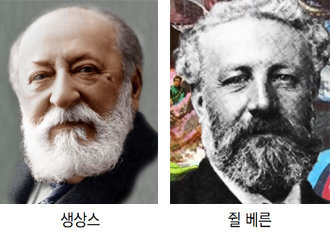Is Saint-Saëns the composer version of Jules Verne?
Is Saint-Saëns the composer version of Jules Verne?
Posted December. 16, 2020 07:45,
Updated December. 16, 2020 07:45



The world has celebrated the 250th birthday of Ludwig van Beethoven in 2020, which has been shaken by COVID-19. Whose year will 2021 be? 2021 marks 100 years since the death of Camille Saint-Saëns (1835~1921), a French composer who is often misunderstood.
His name is well-known as “The Carnival of the Animals” is played at many concerts on Children’s Day. However, Saint-Saëns wrote the playful piece for fun to lift his spirit and did not want the score to be published when he was alive.
Saint-Saëns had an unusual hobby. He loved watching the night sky through a telescope. It was more than an enjoyable pastime for him – He was a member of the French astronomical society. Symphony No. 3 Organ truly captures what he imagined about the universe.
His interest in astronomy and exotic countries such as Arab nations resembles that of novelist Jules Verne. It is unknown if they knew each other. Verne (1828-1905), who was only five years older than Saint-Saëns, conjured up an exciting vision through his works that took their readers on space and submarine explorations or to the Middle East or Siberia. In the imaginary world he created, travelling around the world took only 80 days, which was impossible at the time.
From the 19th century to the early 20th century, the world witnessed significant improvement in science and technology and expansion of knowledge, which filled people with optimism that the humanity could overcome any obstacles and achieve progress. World’s Fair held in London and Paris reflected such outlook. The Eiffel Tower whose construction began a year after Saint-Saëns released Symphony No. 3 also exemplifies the optimistic attitude. Saint-Saëns’s music explores such optimism and spirit as well as the unknown. Listen to some of his famous pieces at “You(Yun-jong)Tube” on YouTube.
gustav@donga.com
Headline News
- Joint investigation headquarters asks Yoon to appear at the investigation office
- KDIC colonel: Cable ties and hoods to control NEC staff were prepared
- Results of real estate development diverged by accessibility to Gangnam
- New budget proposal reflecting Trump’s demand rejected
- Son Heung-min scores winning corner kick







